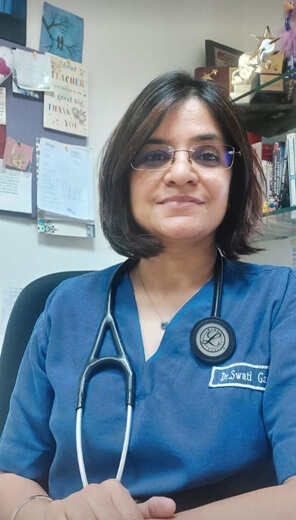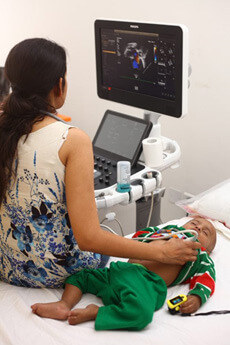Putting the Spotlight on the Causes and Importance of Timely Diagnosis of Congenital Heart Defects: In Conversation with DR Swati Garekar
September 28, 2022
1. How is a congenital heart defect (CHD) different from the heart disease of adults?

When we talk of heart disease in adults what comes to mind is blocked coronary arteries. This is not the case in children. With kids it is not about heart attacks, and it is not about the heart muscle being weak. In 99 per cent of the cases it is about the heart muscle being strong but the structure being abnormal. CHD refers to a spectrum of defects in the structure of the heart that vary in severity. In India, 8-12 out of the 1000 live births have a CHD. A few are simple and may require only a follow-up at a pediatric cardiac centre. The child heart treatment for most other CHDs, such as large holes in the heart, faulty heart valves, wrong connections of vessels or chambers being too small to be useful includes a surgery and/or Cath Lab intervention. While some heart defects are serious and become life threatening right after birth others present themselves in only infancy or toddlerhood.
2. What are the main causes of CHD?
Since CHD is the most common birth defect a lot of research has gone into understand the causes. Unfortunately, in most cases, there is no single identifiable cause. The reasons are multifactorial. In some cases, there is a genetic cause which means that the parents had a defective gene in the chromosomes, or a gene mutated in the baby. Research has shown that Vitamin B9 and B3 (folic acid and niacin) deficiency, exposure to lead, environmental pollutants, maternal flu, German measles can also be potential causes.
3. Are there any ways to prevent CHD?
There is no sure-shot way to prevent CHD. However, one can take some measures that may reduce the risk of CHD. The heart is formed in the first 2 months of pregnancy so this is when one could make a difference. Right from the time of planning a pregnancy, the mother-to-be can take vitamins. She can also check for her German measles titers to make sure she is protected against the virus. Else, a vaccine should be taken before planning the pregnancy. Also, right from planning the pregnancy till the first two months of being pregnant, the mother should try to be in the best possible environment that limits exposure to toxins. Lead, for example, will not come with a signboard, it can be anywhere – in the paint of the walls, in the water we drink, in the dusty air around.
I will also highlight here the importance of the foetal electrocardiography that looks at the heart of the baby inside the mother’s womb. This is best done at 18-20 weeks pregnancy.
4. Is Foetal Echocardiography a part of the normal screening process in India?
The foetal echocardiogram is very labor intensive and costly. Abroad and in India an anomaly scan is done at 18 weeks of pregnancy which looks at the baby from head to toe. With respect to the heart, it should include 4-5 views. If there is a suspicion in this scan or there is some other indication that the foetus needs a formal heart evaluation, it is only then then a foetal echocardiogram is undertaken. The anomaly scan is done by a routine sonographer and one can imagine the huge load of pregnant women and the pressure on the sonographer to get as many scans done in a typical large hospital. If I were to compare the situation abroad and in India, for example a big hospital in London, the detection of major CHDs will be close to 70 % during ante natal check-ups and while in a city like Mumbai, this percentage would be less than 5%. So, we have lots of ground to cover here. Foetal anomalies scan with views of the heart are being conducted but the numbers are very low. The situation however, is better as compared to 5-10 years ago.
5. How is the level of awareness about CHD in a) urban areas B) rural areas?

Let us talk about metropolitan cities or urban areas. The awareness of the fact that a child can be born with a heart defect is itself low. People are surprised that there is a need for a separate field like pediatric cardiology – I get that all the time even from my own friends and family. However, the awareness of CHD and child heart treatment becomes huge in an affected family. Today, the more educated families are able to access a lot of information about child heart treatment from the internet such as Google and YouTube. But in the general public awareness is still lacking. It is becoming better but there is still a lot that needs to done to build awareness about CHD and child heart treatment at the grassroot.
6. Do many cases of CHD go undiagnosed?
An estimate of undiagnosed CHD cases can be made if one uses the fact that out of every 1000 babies, 8-10 will have a heart defect and then looks up the figures of surgeries in pediatric cardiac centres all over India. There is a huge huge gap- meaning, there are large numbers of undetected children with CHD.
7. What can a delayed diagnosis lead to?
Such an important question. With the major heart defects one important implication is that there may be a high pressure in the lung (pulmonary) arteries. Over time this causes the arteries to thicken and cause the bad kind of pulmonary hypertension. This makes the condition irreversible and inoperable. So, a child with a large hole in the heart called a VSD is nice and operable and has minimum risk at 3 months of age but the same child at 12 years of age for example becomes VSD with severe pulmonary hypertension and may not be operable.
And of course, due to a delay in diagnosis, the child remains weak, misses out on the normal growth which takes place in the first couple years of life and tends to get repeated chest infections.
The other implication is that some heart defects cause blueness of the lips and nails. This is either because of mixing of the good and the bad blood or there is too little blood going out to the lungs for oxygenation. Both cause impure blood going out into the body. This makes the blood thick, blood can clot easily, and the child could get strokes.
8. What are the challenges of screening for CHD in India?
In the United States and other Western countries, any newborn child that gets discharged from the hospital, is checked with a pulse oximeter- that was made famous during Covid. They use a baby friendly oximeter to check the saturation. If the child shows abnormal saturation levels repeatedly, then the child is sent for an echocardiogram. The Pulse oximetry helps a large number of the heart defects that cause the babies to turn blue. This kind of a screening model should be implemented in India. I think it is only implemented in Kerala.
The other is increasing the awareness of physicians. Family doctors need to be made aware of how CHDs hide. Not all of them come with that extra sound in the heart and that murmur is heard only if you have a quiet OPD and you get to listen to the heart, which is a luxury especially in government hospitals. CHDs may present as repeated pneumonia episodes in a baby, or lack of adequate weight gain or getting tired while playing. This brings us to the third challenge – the availability of the Echo, the gold standard for screening CHD, is low especially in rural areas.
9. Can children with CHD and who have been treated lead a normal life and have a normal life expectancy?
Looking at two-thirds of the children with CHD, if they have received the child heart treatment on time, they have as good a chance as any other person. Having said that we always say, Once a CHD, always a CHD. Both doctors and families need to remain cautious, but not scared. Even after treatment it is important to maintain regular follow-ups, especially in the growing years. So, the simple answer is yes, the children can have a good quality of life but with a lifelong follow -up.
10. What are the 5 main points to consider if a child has CHD?
CHD is an umbrella term. One child could have a small hole in the heart which may close on its own, while another may have a large hole which may need to be surgically closed at 3 months. Broadly speaking, one must keep the following points in mind:
- Reach out to the correct experts: if one suspects their child to have CHD, it is critical to reach out to the specialists who in this case are the pediatric cardiologists.
- If one has to take a second or third opinion, it should be taken from the pediatric cardiologists only and no other specialist.
- Remember even though the child has CHD, the child’s heart muscle is healthy. You don’t need to stop the butter and ghee intake or restrict them from running around. This is not a heart attack situation.
- Stay in touch with the medical team and continue with follow-ups both pre and post-surgery.
11. Have you seen any correlation between women who have had COVID and diagnosis of CHD in their kids?
Unfortunately, yes. As pediatric cardiologists we have seen a spurt in cases. We are seeing kids with hearts not being able to pump effectively, coronary arteries looking bigger than normal and so on.
12. What are the 3 points to focus on to reduce the burden of CHD related deaths in the country?
A) Expand the Pulse oximeter screening. We should implement it as a national policy.
B) Enhance and support existing government schemes and encourage more NGOS like Genesis Foundation which help in organizing funds for the needy. Many of these families are young couples, they have no savings, no insurance cover and need support for child heart treatment.
C) Increase the penetration of the anomaly scan undertaken during pregnancy and increase the number of heart views done as part of the scan.
Dr. Swati Garekar, is a Senior Pediatric Cardiologist, Fortis Pediatric Heart Care Team, Mulund

